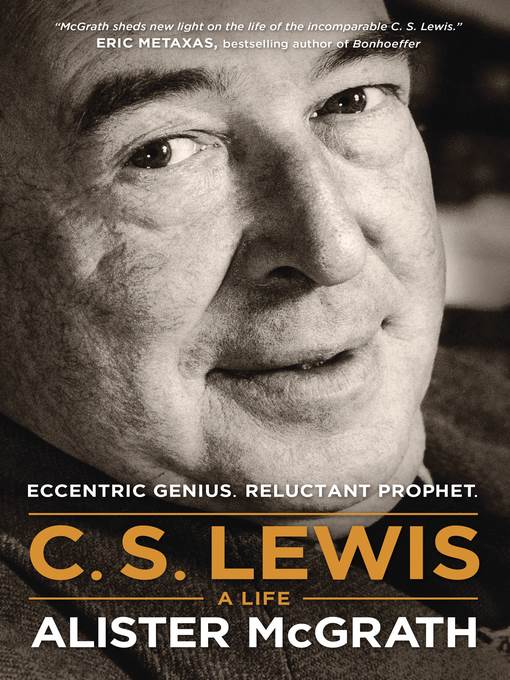
C. S. Lewis — a Life
Eccentric Genius, Reluctant Prophet
کتاب های مرتبط
- اطلاعات
- نقد و بررسی
- دیدگاه کاربران
نقد و بررسی

Starred review from January 14, 2013
To the question of whether the world really needs another biography of C.S. Lewis, McGrath’s lucid and unsentimental portrait of the Christian champion responds with a resounding “yes.” The year 2013 marks the 50th anniversary of Lewis’s death, and times have changed and evangelical sentiments have matured. McGrath offers a new and at times shocking look into the complicated life of this complex figure, in a deeply researched biography. The author takes us headlong into the heart of a Lewis we’ve known little about: his unconventional affair with Mrs. Jane Moore; his hostile and deceptive relationship with his father; his curiosity about the sensuality of cruelty. McGrath navigates the reader through these messy themes, ultimately landing us onto the solid ground of Lewis’s postconversion legacy. He shows with skill, sympathy, dispassion, and engaging prose that Lewis, like the rest of us, did the best he could with the hand he was dealt. . But he got over it, as must all those who would prefer a Lewis without shadows.

January 1, 2013
Christian theologian McGrath (Theology and Ministry/King's College London; Mere Apologetics, 2012, etc.) dissects the life of C.S. Lewis 50 years after the author's death, focusing on how his life was impacted by theology and vice versa. In this chronological account, McGrath splits Lewis' life into sections, beginning with childhood and then moving through his many years at Oxford, his time at Cambridge, and then his death and posthumous popularity. An entire section is also devoted to the Chronicles of Narnia and its religious meaning, conception and popularity. Based almost completely on Lewis' letters, the biography is rich with information but short on the sort of anecdotes that make author biographies so colorful. McGrath focuses mainly on Lewis' religious development, with a secondary theme of the relationships that affected his work. This concentration on Lewis' role in apologetics may be due to the fact that McGrath himself is an apologist and finds common ground with Lewis in this area. While this focus may be useful for Lewis scholars and die-hard fans, it feels narrow for a literary biography. McGrath is clearly a huge fan of his subject; while he doesn't shy away from criticism of the man's life or work, he does downplay it. For instance, in discussing Lewis' Space Trilogy, McGrath states, "The quality of these is somewhat uneven, with the third being particularly difficult in places. Yet the main thing to appreciate is not so much their plots and points, but the medium through which they are expressed--stories, which captivate the imagination and open the mind to an alternative way of thinking." This is characteristic of McGrath's attitude throughout the book. While not necessarily a problem, it wears thin in some places where more support is needed to make a truly sound argument. Dense for general readers but an excellent scholarly read encompassing new ideas for Lewis devotees or those interested in religious argument.
COPYRIGHT(2013) Kirkus Reviews, ALL RIGHTS RESERVED.

February 15, 2013
So many biographies of C.S. Lewis are available that one might wonder whether this latest is needed. However, McGrath's (theology & ministry, King's Coll. London; The Dawkins Delusion) C.S. Lewis is unique in a few ways. First, it is written by a major theologian who can provide excellent insights into Lewis's thought. Second, it utilizes the revised and enlarged edition of Lewis's collected letters, an expansive edition available only in the past decade. Third, it contains new thoughts on Lewis's life, such as a different date for his conversion to Christianity, based on a careful reading of primary sources, and discussion of how Lewis's letters show that he could compartmentalize some experiences, while others tormented him; he stated that his difficult school years were worse than serving as a frontline infantryman in World War I. McGrath furthermore writes an accessible biography, with a chronological narrative followed by discussion of Lewis's "afterlife," addressing how interest in Lewis has heightened from the 1970s or 1980s to the present. VERDICT Both general readers and scholars interested in Lewis will find this book very helpful.--John Jaeger, Dallas Baptist Univ. Lib., TX
Copyright 2013 Library Journal, LLC Used with permission.

Starred review from February 1, 2013
Medievalist, Christian apologist, and fantasist C. S. Lewis (18981963) has had exponentially more readers since his death than he enjoyed in his lifetime. Biographies and studies of his work are legion. Despite that copious documentation, Oxford theologian McGrath discovered a major inaccuracy in all previous accounts of Lewis, including his glowing spiritual autobiography, Surprised by Joy (1955). Diligent combing of Lewis' correspondence disclosed that his conversion to Christianitythe catalyst for virtually all his creative workoccurred in 1930, not 1929. Well, Lewis admitted he wasn't good with dates, and a plethora of anxiety-inducing deadlines involved in the major developments in his life rather justify his confusion. McGrath doesn't speculate about how Lewis' chronic achronology may have affected his work. Instead, he limns Lewis' major experiencesearly loss of his mother, horrifying schooling, WWI service (about which he never spoke), long Oxford fellowship, BBC-fostered celebrity in the 1940s, creation of Narnia, late-career move to Cambridge, and brief marriage to Joy Davidman (191560)his great friendships (especially with J. R. R. Tolkien), and his books. McGrath does this so limpidly, so intelligently, and so sympathetically that this biography is the one Lewis' admirersespecially those who, like him, believe that books are to be read and enjoyedshould prefer to all others.(Reprinted with permission of Booklist, copyright 2013, American Library Association.)

























دیدگاه کاربران